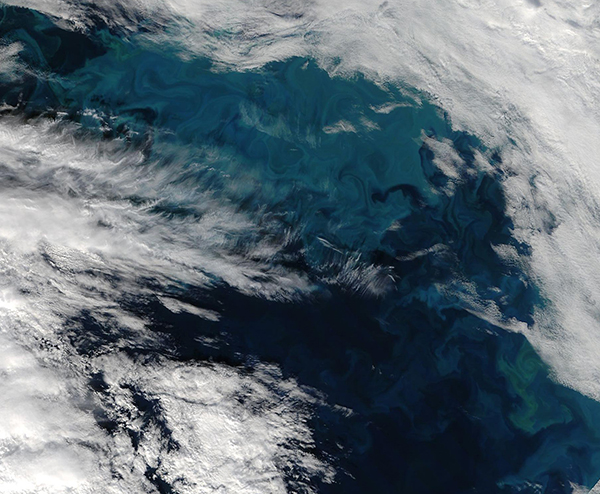Images
August 12, 2022 - Blooms North of Scandinavia
Tweet
On August 5, 2022, clouds covering the Barents Sea opened just as NASA’s Terra satellite passed overhead, allowing the Moderate Resolution Imaging Spectroradiometer (MODIS) on board to capture a true-color image of brilliant swirls of blues and greens.
The spectacular color was created by a massive bloom of phytoplankton, which are microscopic plant-like organisms that live in these waters year-round. It’s only when conditions are perfect—the right water temperatures, daylight length, and nutrient load—that phytoplankton reproduce explosively to create huge blooms such as this. This view is a rare treat, since the Barents Sea sits under cloud cover about 80 per cent of time during the summer months.
Many different species of phytoplankton live in this region, each lending slightly different colors to the waters when they predominate in a bloom. One specific type of phytoplankton common in the high light levels of the Arctic summer are called coccolithophores. They are unique as they contain plates made out of calcium carbonate, a chalk-colored substance that lends a milky tone to blooms rich in these organisms. The color of this Barents Sea bloom suggests it is rich in coccolithophores.
The bloom is located north of the Scandinavian Peninsula and south of Svalbard archipelago, in a shallow area of the Barents Sea where several ocean current systems merge and to form the North Cape Current. The clashing of currents creates mixing of waters and raises nutrients from the sea floor, and also helps paint a swirling image as the colorful floating bloom is swept along by eddies. The Barents Sea is ice-covered for most of the year and reaches its warmest temperatures in August, creating perfect conditions for phytoplankton blooms.
Image Facts
Satellite:
Terra
Date Acquired: 8/5/2022
Resolutions:
1km (180.4 KB), 500m (512 KB), 250m (1.3 MB)
Bands Used: 1,4,3
Image Credit:
MODIS Land Rapid Response Team, NASA GSFC
Tweet
On August 5, 2022, clouds covering the Barents Sea opened just as NASA’s Terra satellite passed overhead, allowing the Moderate Resolution Imaging Spectroradiometer (MODIS) on board to capture a true-color image of brilliant swirls of blues and greens.
The spectacular color was created by a massive bloom of phytoplankton, which are microscopic plant-like organisms that live in these waters year-round. It’s only when conditions are perfect—the right water temperatures, daylight length, and nutrient load—that phytoplankton reproduce explosively to create huge blooms such as this. This view is a rare treat, since the Barents Sea sits under cloud cover about 80 per cent of time during the summer months.
Many different species of phytoplankton live in this region, each lending slightly different colors to the waters when they predominate in a bloom. One specific type of phytoplankton common in the high light levels of the Arctic summer are called coccolithophores. They are unique as they contain plates made out of calcium carbonate, a chalk-colored substance that lends a milky tone to blooms rich in these organisms. The color of this Barents Sea bloom suggests it is rich in coccolithophores.
The bloom is located north of the Scandinavian Peninsula and south of Svalbard archipelago, in a shallow area of the Barents Sea where several ocean current systems merge and to form the North Cape Current. The clashing of currents creates mixing of waters and raises nutrients from the sea floor, and also helps paint a swirling image as the colorful floating bloom is swept along by eddies. The Barents Sea is ice-covered for most of the year and reaches its warmest temperatures in August, creating perfect conditions for phytoplankton blooms.
Image Facts
Satellite:
Terra
Date Acquired: 8/5/2022
Resolutions:
1km (180.4 KB), 500m (512 KB), 250m (1.3 MB)
Bands Used: 1,4,3
Image Credit:
MODIS Land Rapid Response Team, NASA GSFC




